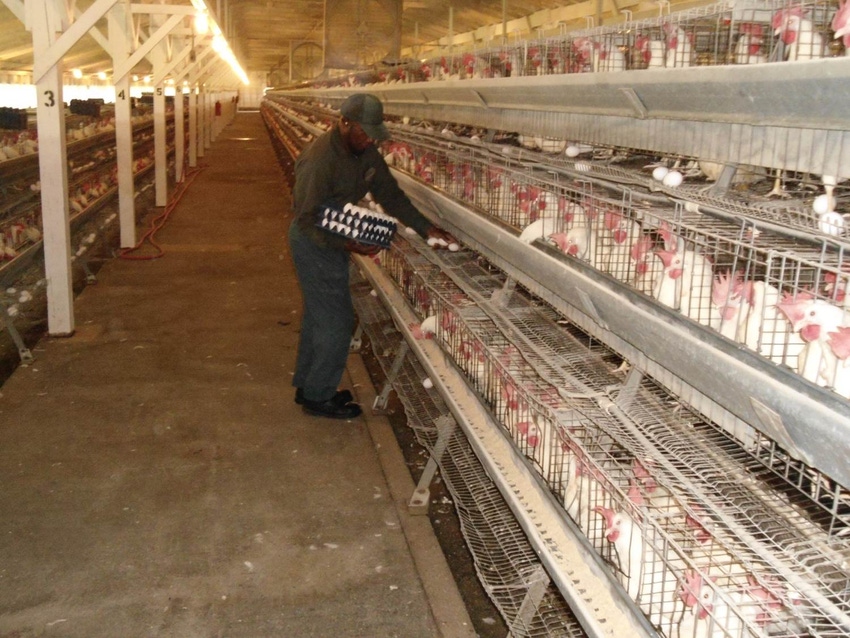
For more than 125 years now, the Caledonia Prison Farm has operated in North Carolina’s Halifax County to put prisoners to work to grow their own food.
The Caledonia Correction Institution has operated as a prison farm since 1892. In 1899, the farm was purchased by the state of North Carolina and has operated on state-owned land ever since. Today, the Caledonia Correctional Institution operates on 8,000 acres in Halifax County. Of those 8,000 acres, 5,000 acres are under production with 3,500 acres currently farmed.
Phillip Sykes, industry director for food products and services for North Carolina’s Correction Enterprises, the state agency that runs the farm, notes that the farm currently produces 2,600 acres of soybeans, 200 acres of field corn, 100 acres of turnip greens, 200 acres of sweet corn, 25 acres of sweet potatoes, 10 acres of cabbage, 30 acres of oats, and three acres of squash. In addition, the prison farm has honeybees, 300 acres of hay and 43,000 layer chickens.
“The field corn and soybeans are sold on the open market. Everything else that is grown goes straight to the cannery to be canned for prison use only,” Sykes says. Some of the fresh vegetables are sold to the Food Banks of Eastern and Central North Carolina and the prison farm does sell hay to local farmers.
“We don’t have the manpower or equipment to farm all 5,000 acres, so we lease out 1,700 acres to local farmers. This is the higher ground and it is good cotton land. We don’t grow cotton and peanuts because as a governmental agency, we can participate in government farm programs,” Sykes says.
Karen Brown, director of Correction Enterprises, makes it clear that the Caledonia Prison Farm is not there to compete against North Carolina farmers. “Caledonia’s purpose is the training and rehabilitation of inmates. By statute, inmates are supposed to grow their own food. They are primarily growing crops for inmate consumption,” she says.
The farm provides canned goods for all of North Carolina’s 55 state prisons and some county jails. In addition, Tar Heel Challenge Academy, which is run by the National Guard to train at risk youth, purchases canned goods from the farm. “When you have 38,000 inmates eating three meals a day, that’s a lot of canned goods,” Brown says.
In addition, the layer chickens at Caledonia supply eggs to inmates across the state. Inmates work in all areas of operation, from the actual farm, to the chicken operation to the cannery. Brown says the overriding goal is to train and rehabilitate offenders and provide them with marketable job skills once they get out of prison.
“Most of the offenders who are incarcerated have never had a legal job before in their lives so they don’t even know how towork. We have seventeen different industries in Correction Enterprises with Food and Farming being one of them,” she explains. “Whatever the job is, safety training comes first. We provide technical skills training, such as how to drive a forklift. Then we work on soft skills, such as how to write a resume. Some prisoners don’t even know how to tie a tie, so we teach them how to do that so they can go on job interviews.”
Brown explains that many of the prisoners have anger issues and poor communication skills so Correction Enterprises works with them so they can return to society as law-abiding, tax-paying citizens with valuable job skills.
“The best way to do that is a model that represents a real world environment and that’s what we are trying to do,” she stresses. “We ensure they come to work on time, which sounds easy because they are incarcerated, but it’s not always easy. We hire them and fire them and have them interview for jobs. We provide them bonus pay when they meet quality standards or improve production standards, and we provide bonuses if they do something that saves Correction Enterprises money.”
Inmates can receive certification for various job skills which will help them become employed once they leave prison. “We do anything we can to help them build their resume that doesn’t say I dealt drugs my whole life. This certification says I’ve done something and accomplished this,” Brown says.
“Our goal is to show they were productive while they were incarcerated. They were productive and they earned a certification. It shows they didn’t just sit around all day and just lift weights. We prepare them for release to get a job within 90 days because if they don’t get that job in 90 days and have some income to provide for themselves and their families, they’re going right back to crime again.”
Sykes adds that many of the inmates who worked with the layer chickens go to work for Perdue’s egg operation in North Carolina once they leave Caledonia because they are now trained to do the work which is valuable to Perdue. “They move into private industry and can do the exact same thing,” he says.
The farm has 120 inmate positions with inmates working in such jobs as equipment operators, tractor drivers, poultry workers and maintenance workers. In addition, the farm shop employs 15 inmates who perform general maintenance tasks such tasks as changing starters or changing tires on tractors. The cannery employs 154 inmates and the cannery produces 28 different products ranging from black-eyed peas to pinto beans to teas, juices and pancake syrup.
The fresh produce operation employs 25 inmates with various positions such as fork lift operators, inventory management and office clerks. “We teach them how to prepare Excel Spreadsheets so they can develop financial skills,” Sykes says.
Brown points out that the work of Correction Enterprises is 100 percent receipt supported. “We are totally self-sufficient through the products we produce and the sales we make. We are a state agency, but we don’t receive any tax money. Our salaries and expenses are all paid for by the revenue we generate,” she says.
Correction Enterprises is a $97 million per year business with Food and Farm representing 20 percent of the business. Other divisions make license plates, highway road signs, eyeglasses for Medicaid patients, uniforms for state workers, janitorial products and metal products. Correction Enterprises has a total of 17 different industries. Reaching out to businesses and farms to hire the inmates who have done their time is a key part of the mission of Correction Enterprises.
“Michael Lockamy, our reentry coordinator, speaks with businesses and farms across the state so they will hire these ex-offenders. He helps place the offenders who have worked for Correction Enterprises and he has been very successful. Many of them are motivated to get a job in the area they were trained in and continue to use those skills to make a better life. We find that more North Carolina businesses and farms are willing to give these inmates who have served their time a second chance,” Brown says.

undefined
Karen Brown, left, director, and Phillip Sykes, industry director for food products and services, for North Carolina’s Correction Enterprises are shown at the agency’s Raleigh offices where some of the items made by inmates are displayed. Correction Enterprises manages the Caledonia Prison Farm in Halifax County.
About the Author(s)
You May Also Like






